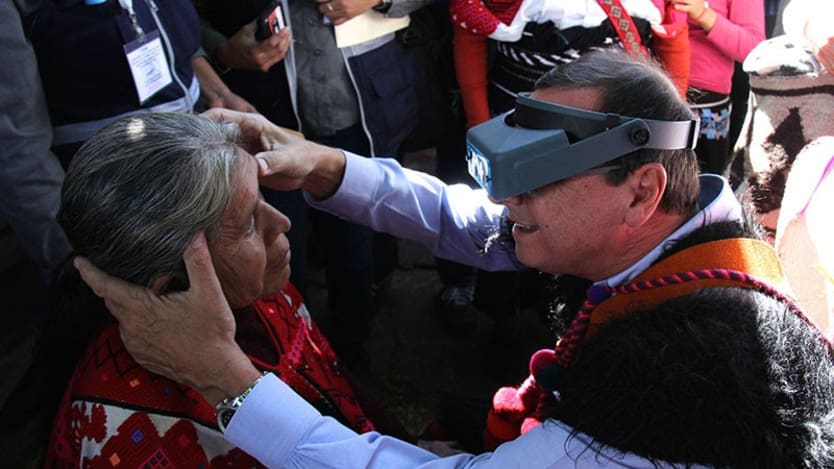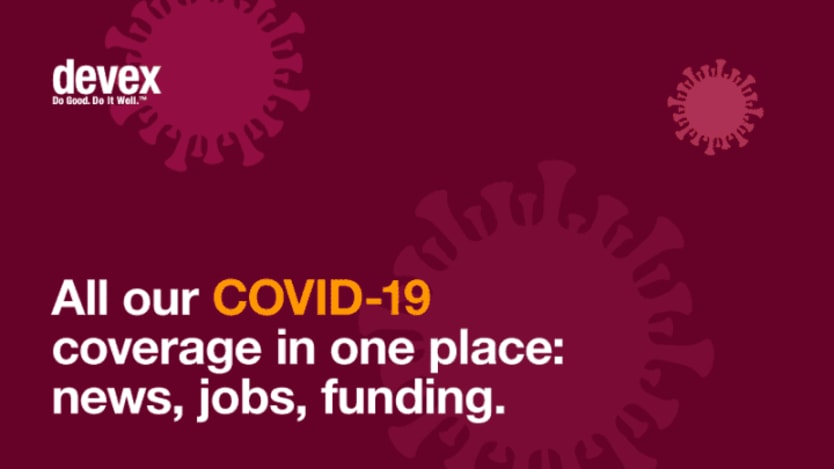
SAN FRANCISCO — The COVID-19 crisis has forced the neglected tropical disease sector to halt mass drug administrations, which are at odds with social distancing.
The END Fund, an initiative that pools investments from donors and directs them to programs to end the most common NTDs, sees clear overlaps between preventing COVID-19 and preventing NTDs, such as the importance of hand-washing.
Watch: END Fund CEO on pandemic impact on NTDs
Devex President and Editor-in-Chief Raj Kumar speaks to Ellen Agler, CEO of The END Fund, about how the coronavirus pandemic has impacted her organization's efforts to treat neglected tropical diseases.
The organization has launched a new fund to support health workers responding to the pandemic while also preserving the gains that have been made in ending NTDs.
“We believe that local partners and local context are necessary for making quick yet informed decisions about the highest and best use of philanthropic dollars in crisis response scenarios,” Ellen Agler, CEO of The END Fund, said in an email to Devex.
A range of nonprofits, including those that do not typically respond to pandemics, are pivoting their programming as a result of COVID-19. For some organizations, the transition comes naturally, both from a fundraising perspective and due to the potential for impact. But there is a risk of organizations diverting time and resources from critical programming that addresses some of the very problems the pandemic has made visible.
Nonprofits and donors alike are asking themselves how much they should pivot in response to the current crisis. Unless they have direct experience to build upon or can connect their work to building back better, they should consider sticking to their mandate, said Michael Jarvis, executive director of the Transparency and Accountability Initiative, a collaborative of leading funders focused on empowering citizens and holding governments to account.
“We all need to adapt, but we don’t all need to become about the pandemic,” Jarvis said.
As the world moves from response to recovery, nonprofits and donors have a responsibility to continue serving the communities and tackle the problems they were committed to prior to the pandemic, he said.
“If you’re not continuing to hold up that cause, then who is?” Jarvis said. “There are genuine reasons these issues matter, and they are still going to matter when we come out the other side of this.”
The ELMA Group of Foundations, which supports improving the lives of children in Africa and a range of other causes, made new investments in response to COVID-19 while also ramping up funding to organizations across its portfolio.
“The funding team said, ‘You can count on the continuity of ELMA funding, even if your activities are going to pivot or be delayed or otherwise change,’” said Robyn Calder Harawi, executive director of The ELMA Philanthropies Services.
ELMA is committed to ensuring continuity of services for groups working on issues such as maternal and child health and early childhood development. These organizations may not be pivoting to address the pandemic but instead need to adjust their programming to operate amid the crisis, Harawi said.
Not all funders have provided this reassurance, leading some nonprofits to feel pressure to connect their work to the coronavirus out of concern that donors may direct a large portion of their resources to the pandemic.
“We all need to adapt, but we don’t all need to become about the pandemic.”
— Michael Jarvis, executive director, Transparency and Accountability Initiative“If it’s just driven by the funding, then that’s never a good thing,” said Blair Glencorse, executive director of Accountability Lab, an organization focused on making governance work for citizens. “The funding will run out, and if and when we get control of this, things are going to shift again.”
This is not the first time the Accountability Lab has adapted its work to meet the needs of a crisis. Glencorse built on his experience responding to the 2015 earthquake in Nepal and the Ebola outbreak in Liberia when he considered how Accountability Lab could respond to the COVID-19 pandemic, and he described all three scenarios as crises of trust and accountability. The organization is now validating information and debunking rumors for citizens trying to navigate the pandemic in Nepal, Pakistan, South Africa, Mali, Niger, and Nigeria.
When it comes to coronavirus response, the question is not simply whether nonprofits can be useful, experts told Devex, but whether groups are engaging in the most useful ways possible — and not tackling something that others can do better.
“We always ask ourselves how we can focus on 'killer' — not 'filler' — projects that will genuinely make a difference to delivery of front-line services,” said Gavin Hayman, executive director of the Open Contracting Partnership, which seeks to transform public procurement. “Making sure that the COVID-19 procurement effort was smart and coordinated was a compelling example of that.”
Some organizations could not carry out their normal operations due to social-distancing protocols, which freed up capacity to respond to the pandemic.
This was the case for The HALO Trust, which clears land mines and debris left behind by war. In certain geographies, lockdown measures have brought the clearance of land mines to a halt.
The organization identified ways it could repurpose mapping skills and software for scanning minefields to tracking outbreaks and shifted the focus of its education programs from explosives to pandemics.
As lockdown measures ease, the organization will balance what it can continue to do to respond to COVID-19 with a return to land mine clearance, said Paul McCann, director of communications at The HALO Trust.
“We always ask ourselves how we can focus on 'killer' — not 'filler' — projects that will genuinely make a difference to delivery of front-line services.”
— Gavin Hayman, executive director, Open Contracting PartnershipVisionSpring, a social enterprise aiming to provide affordable eyeglasses globally, has redirected its focus to sourcing personal protective equipment for front-line health workers, distributing cloth masks to prevent community spread of the virus, and setting up hand-washing stations featuring health information.
Strategically, one of the most important questions for VisionSpring is how the coronavirus response gets the team back to glasses, CEO Ella Gudwin told Devex.
Drawing on her background in humanitarian operations and emergency response, she said her advice for other nonprofit leaders includes getting comfortable with ambiguity, learning by doing, and just getting started.
“Keep your eye on your money, and get a real clear view on where you’ll have revenue shortfalls and where your COVID pivot will and will not make up for that,” Gudwin said.
She said all of her donors have stayed with her, with some increasing their contributions and others saying they will continue to support VisionSpring because they see how the coronavirus response is necessary for getting back to providing vision services.
Visit our dedicated COVID-19 page for news, job opportunities, and funding insights.









